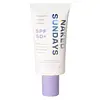What's inside
What's inside
 Key Ingredients
Key Ingredients

 Benefits
Benefits

 Concerns
Concerns

 Ingredients Side-by-side
Ingredients Side-by-side

Zinc Oxide
Cosmetic ColorantWater
Skin ConditioningCoco-Caprylate/Caprate
EmollientPhenoxyethanol
PreservativeEthylhexylglycerin
Skin ConditioningCollagen
MoisturisingSodium Benzoate
MaskingSodium Chloride
MaskingPEG-8 Stearate
EmulsifyingOctyldodecanol
EmollientCitrullus Lanatus Fruit Extract
Skin ConditioningCaprylic/Capric Triglyceride
MaskingGlycerin
HumectantPolyglyceryl-3 Polyricinoleate
EmulsifyingCetearyl Alcohol
EmollientDisodium EDTA
Xanthan Gum
EmulsifyingGluconolactone
Skin ConditioningIsostearic Acid
CleansingCetearyl Glucoside
EmulsifyingHydrolyzed Soy Protein
HumectantRice Amino Acids
Skin ConditioningCalcium Gluconate
HumectantProline
Skin ConditioningHydrolyzed Adansonia Digitata Seed Extract
Iron Oxides
Zinc Oxide, Water, Coco-Caprylate/Caprate, Phenoxyethanol, Ethylhexylglycerin, Collagen, Sodium Benzoate, Sodium Chloride, PEG-8 Stearate, Octyldodecanol, Citrullus Lanatus Fruit Extract, Caprylic/Capric Triglyceride, Glycerin, Polyglyceryl-3 Polyricinoleate, Cetearyl Alcohol, Disodium EDTA, Xanthan Gum, Gluconolactone, Isostearic Acid, Cetearyl Glucoside, Hydrolyzed Soy Protein, Rice Amino Acids, Calcium Gluconate, Proline, Hydrolyzed Adansonia Digitata Seed Extract, Iron Oxides
Butyl Methoxydibenzoylmethane
UV AbsorberOctocrylene
UV AbsorberPEG-100
HumectantEthylhexyl Salicylate
UV AbsorberDimethicone
EmollientTocopheryl Acetate
AntioxidantEthylhexylglycerin
Skin ConditioningGluconolactone
Skin ConditioningGlyceryl Stearate
EmollientAloe Barbadensis Leaf Polysaccharides
EmollientHydrolyzed Rice Protein
Skin ConditioningHydrolyzed Soy Protein
HumectantPhenoxyethanol
PreservativePotassium Cetyl Phosphate
EmulsifyingProline
Skin ConditioningWater
Skin ConditioningSodium Benzoate
MaskingSodium Polyacrylate
AbsorbentCitrullus Lanatus Fruit Extract
Skin ConditioningButyl Methoxydibenzoylmethane, Octocrylene, PEG-100, Ethylhexyl Salicylate, Dimethicone, Tocopheryl Acetate, Ethylhexylglycerin, Gluconolactone, Glyceryl Stearate, Aloe Barbadensis Leaf Polysaccharides, Hydrolyzed Rice Protein, Hydrolyzed Soy Protein, Phenoxyethanol, Potassium Cetyl Phosphate, Proline, Water, Sodium Benzoate, Sodium Polyacrylate, Citrullus Lanatus Fruit Extract
Ingredients Explained
These ingredients are found in both products.
Ingredients higher up in an ingredient list are typically present in a larger amount.
Citrullus Lanatus Fruit Extract comes from the watermelon. Watermelon has antioxidant and anti-inflammatory properties.
Watermelons are rich in antioxidants such as Vitamin A, Vitamin C and lycopene. It also contains sugars and amino acids, such as arginine and glutathione.
Lycopene is a potent antioxidant. Besides helping to protect your skin against free-radical molecules, it also helps soothe the skin. Lycopene gives watermelon the distinct red color.
Learn more about Citrullus Lanatus Fruit ExtractEthylhexylglycerin (we can't pronounce this either) is commonly used as a preservative and skin softener. It is derived from glyceryl.
You might see Ethylhexylglycerin often paired with other preservatives such as phenoxyethanol. Ethylhexylglycerin has been found to increase the effectiveness of these other preservatives.
Gluconolactone is a PHA. PHAs are a great gentle alternative to traditional AHAs.
When applied, Gluconolactone has the same affect on skin as AHAs such as lactic acid. It helps dissolve the dead skin cells in the top layer of your skin. This improves texture and brightens the skin.
PHAs are more gentle than AHAs due to their larger structure. They do not penetrate as deeply as AHAs and take a longer time to dissolve dead cells. Studies show PHAs do not cause as much irritation.
Gluconolactone has some interesting properties:
In a 2004 study, Gluconolactone was found to prevent UV damage in mouse skin cells and has not been found to increase sun sensitivity. However, we still recommend wearing SPF daily.
This ingredient is is an created by reacting gluconic acid with an alcohol.
Learn more about GluconolactoneHydrolyzed Soy Protein is a vegan protein made to mimic hydrolyzed collagen. It is created from soy, or glycine soja.
This ingredient is a humectant, meaning it helps hydrate the skin by binding to water. According to a manufacturer, it is also a great hair conditioner.
Read more about hydrolyzed collagen here.
Learn more about Hydrolyzed Soy ProteinPhenoxyethanol is a preservative that has germicide, antimicrobial, and aromatic properties. Studies show that phenoxyethanol can prevent microbial growth. By itself, it has a scent that is similar to that of a rose.
It's often used in formulations along with Caprylyl Glycol to preserve the shelf life of products.
Proline is an amino-acid. It helps moisturize the skin and plays an important role in creating proteins.
Our skin uses proline as one of the building blocks for producing collagen.
In medicine, proline is used as an osmoprotectant. This means it helps prevent oxidative degradation in other drugs.
Our bodies are able to produce proline naturally, but certain conditions may inhibit this production. In that case, proline can be obtained from eating egg whites, soy protein, dairy products, asparagus, mushrooms, and seaweed.
Learn more about ProlineSodium Benzoate is a preservative. It's used in both cosmetic and food products to inhibit the growth of mold and bacteria. It is typically produced synthetically.
Both the US FDA and EU Health Committee have approved the use of sodium benzoate. In the US, levels of 0.1% (of the total product) are allowed.
Sodium benzoate works as a preservative by inhibiting the growth of bacteria inside of cells. It prevents the cell from fermenting a type of sugar using an enzyme called phosphofructokinase.
It is the salt of benzoic acid. Foods containing sodium benzoate include soda, salad dressings, condiments, fruit juices, wines, and snack foods.
Studies for using ascorbic acid and sodium benzoate in cosmetics are lacking, especially in skincare routines with multiple steps.
We always recommend speaking with a professional, such as a dermatologist, if you have any concerns.
Learn more about Sodium BenzoateWater. It's the most common cosmetic ingredient of all. You'll usually see it at the top of ingredient lists, meaning that it makes up the largest part of the product.
So why is it so popular? Water most often acts as a solvent - this means that it helps dissolve other ingredients into the formulation.
You'll also recognize water as that liquid we all need to stay alive. If you see this, drink a glass of water. Stay hydrated!
Learn more about Water